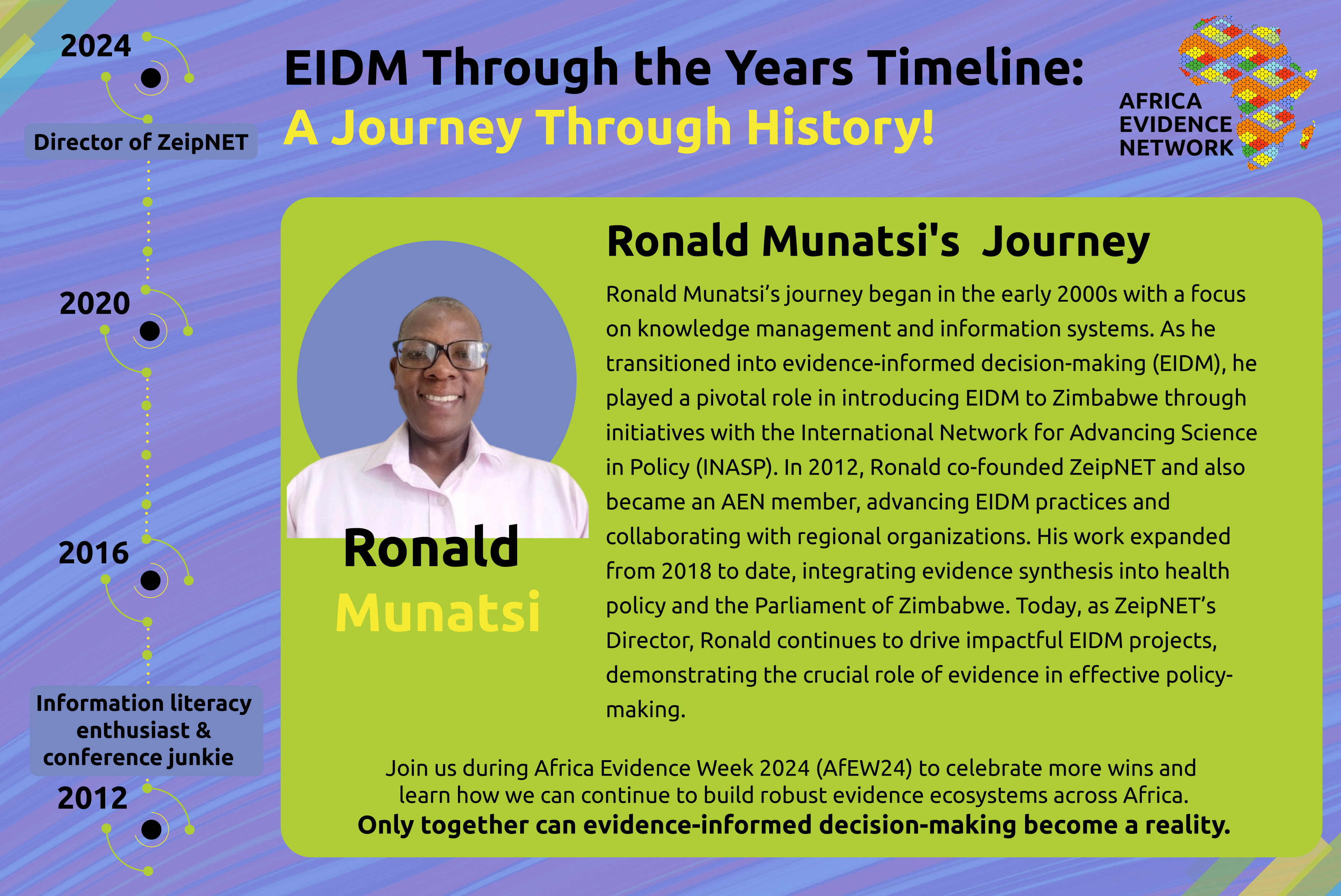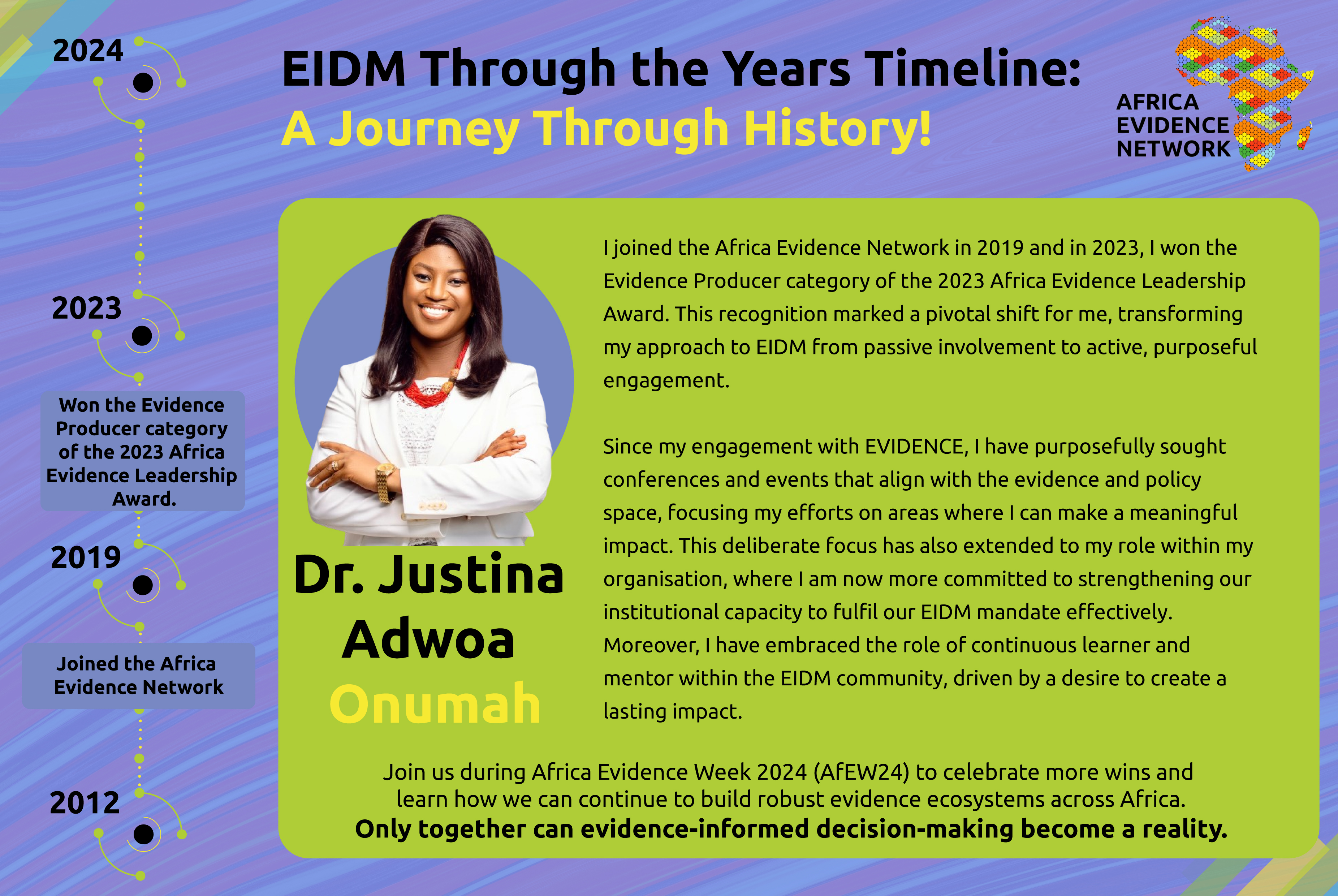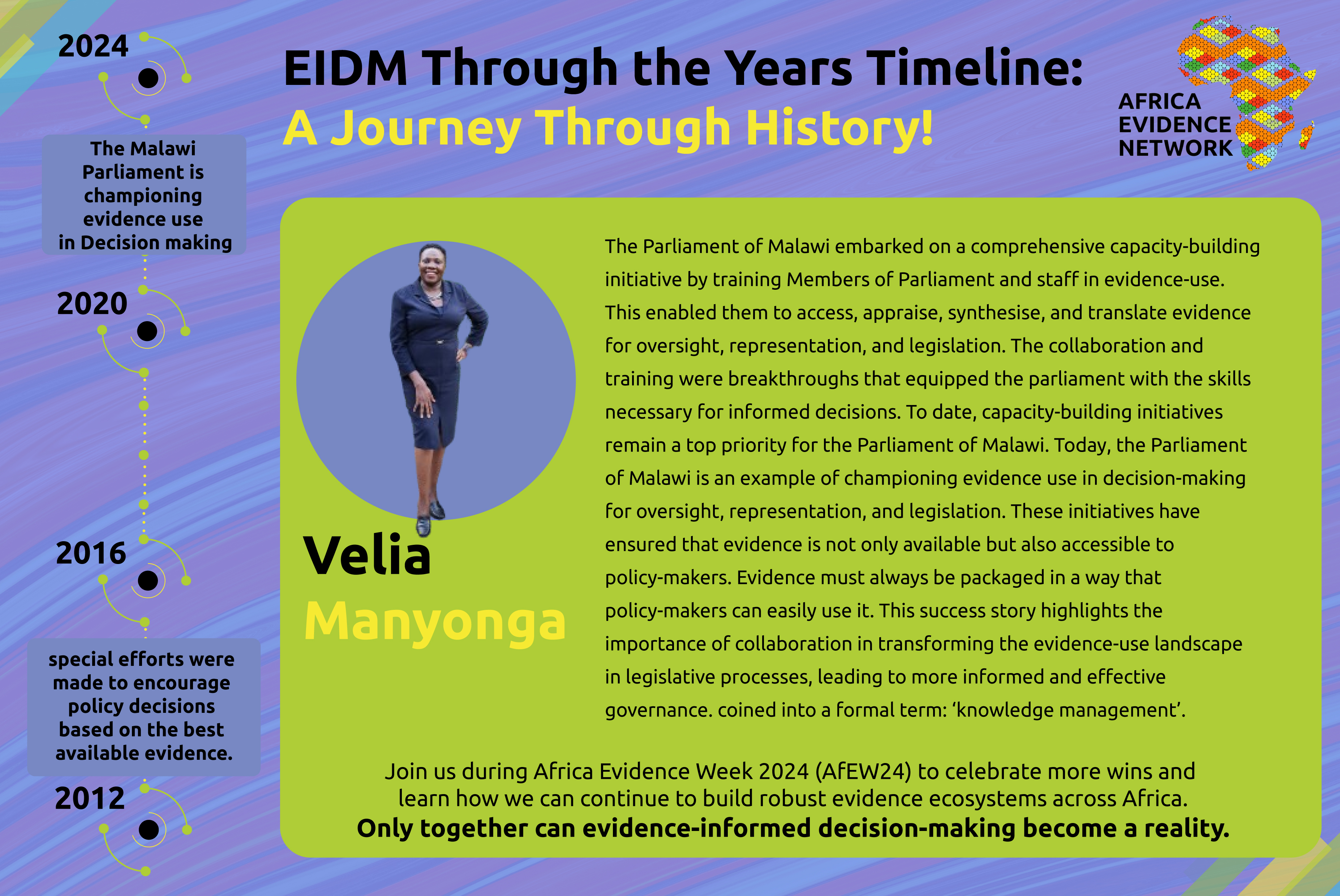
Welcome to the EIDM through the years timeline, where we celebrate Africa’s evidence-informed decision-making (EIDM) journey by reflecting on the incredible progress achieved in implementing EIDM across the continent. This is an interactive timeline showcasing key milestones in EIDM development.
In this conversation, the Africa Evidence Network talks to Ronald Munatsi, the Director of the Zimbabwe Evidence Informed Policy Network (ZeipNET).
My initial engagement with EIDM
My experience with evidence-informed decision-making (EIDM) has been characterised by phases of blind personal development, networking, inspiration, experimentation, and, in the end, identifying a niche in the EIDM field that is rife with opportunities to utilise evidence to impact lives. My career background is in knowledge management and management information systems. Following my undergraduate education, I became more like a ‘conference junkie' since I was so focused on personal growth. My primary focus was on training seminars and conferences related to library and information sciences along with related technologies that facilitate efficient knowledge curation, dissemination and use. I ended up becoming somewhat of an information literacy specialist as a result of this. Nonetheless, information professionals like librarians and administrators of information and communication were the primary audience for my early career initiatives. This occurred between the early and mid-2000s. With the exception of the health care sector, where evidence-based decision-making was already being used, the word "evidence" had not yet acquired the current meaning in the context of policy and other decision-making during this time.
The first seeds of EIDM in Zimbabwe
Although EIDM was practised in various ways, the International Network for Advancing Science in Policy (INASP), originally the International Network for Scientific Publications, is the institution that began planting the first seeds for deliberate EIDM implementation in Zimbabwe. This was accomplished through its Programme for Enhancement of Research Information (PERI), which was implemented in the early 2000s and the Strengthening Research and Knowledge Systems (SRKS) towards the end of the same decade. The goal of these programs was to increase the capacity of early career researchers to produce, access, evaluate, and disseminate their research in an efficient manner. In these projects, I served as one of the facilitators. Even at this point, the EIDM notion was still a little nebulous. It wasn't until I began working for the Parliament of Zimbabwe (PoZ) that I became acquainted and fascinated with its conceptualisation and connection to policy and other decision-making. The PoZ was the first beneficiary policy institution where we offered information literacy training targeted to Parliament researchers and librarians, including the lawmakers themselves after our proposal to expand the INASP SRKS project beyond academics to policymaking institutions.
Deliberate efforts to strengthen EIDM
In 2012, we were inspired to establish an organisation to assist in the implementation of EIDM after observing the impact of the first capacity development programs aimed at policymakers. This organisation, called Zimbabwe Evidence Informed Policy Network (ZeipNET), was initially funded by the Foreign, Commonwealth & Development Office (FCDO), formerly the Department for International Development (DFID), in 2013 as part of the Vakayiko consortium led by INASP. From 2013 to 2017, we implemented programs for the PoZ and a few other government ministries under their Building Capacity to Use Research Evidence (BCURE) initiative to increase awareness of both process and individual level skills. We collaborated with the Africa Evidence Network and other regional organisations like Cochrane South Africa to raise awareness and improve evidence synthesis abilities with the country. As a consortium we also developed an Evidence Informed Policy Making Curriculum that we piloted in Zimbabwe and Ghana and ended up being adopted in the later country’s Civil Service Training Centre. From 2018-2021, with assistance from the World Health Organisation Alliance for Health Policy and Systems Research, where we collaborated with the Centre for Rapid Evidence Synthesis (ACRES) and the AEN, we have also been able to integrate a rapid evidence synthesis platform within the Zimbabwe Ministry of Health and Child Care. Evidence outputs from the project were used to inform a number of policy initiatives, notably the National Health Insurance Bill that is currently pending in Parliament and the current National Health Strategy. In order to improve the PoZ’s knowledge creation, management, and communication systems, we are currently working with IDinsight to support the Parliament in a number of evidence generation, synthesis, and communication interventions. One such intervention involves integrating artificial intelligence and other data science technologies. Collaborations with a variety of players have been crucial in ZeipNET's transformation over the years into Zimbabwe's premier evidence intermediary institution.
The future of sustainable EIDM in Zimbabwe
Although we have had varying degrees of success with different initiatives, EIDM implementation has mainly been undermined by the overemphasis on individual level capacities and the undervaluation of institutional and systemic level processes. Evidence suggests that the institutional network of Zimbabwe is not providing enough support for EIDM in a number of sectors. ZeipNET, therefore, seeks to intensify efforts to enhance Zimbabwe's national evidence ecosystem through bolstering network capacity at the institutional and individual levels as well as improving the efficiency with which policy and research institutions employ a range of EIDM resources. A crucial component of this process is having related courses at tertiary institutions—especially universities, research institutes, and think tanks—that highlight evidence synthesis issues like systematic reviews. Another essential component of the EIDM mix is the establishment of platforms or communities of practice for interaction and knowledge sharing amongst the numerous EIDM stakeholders. This would increase the sustainability of EIDM institutionalisation. All of these interventions will require strategic connections and collaborations at the national, regional, and worldwide levels.
About the author: Ronald Munatsi is the Director of the Zimbabwe Evidence Informed Policy Network (ZeipNET). ZeipNET works to interface evidence and policy through evidence synthesis initiatives, including institutional capacity building focusing on the interface between research and policy with an emphasis on strengthening capacities across individual, institutional and systemic levels.
Acknowledgements: The author(s) is solely responsible for the content of this article, including all errors or omissions; acknowledgements do not imply endorsement of the content. The author is grateful to Charity Chisoro for her guidance in the preparation and finalisation of this article as well as her editorial support.
Disclaimer: The views expressed in published blog posts, as well as any errors or omissions, are the sole responsibility of the author/s and do not represent the views of the Africa Evidence Network, its secretariat, advisory or reference groups, or its funders; nor does it imply endorsement by the afore-mentioned parties.
Suggested citation: Munatsi, R. (2024) Overemphasis of individual level capacities and undervaluation of institutional and systemic level processes undermining EIDM institutionalisation. Blog posting on 24 July 2024. Available at: https://www.africaevidencenetwork.org/en/learning-space/article/333/

